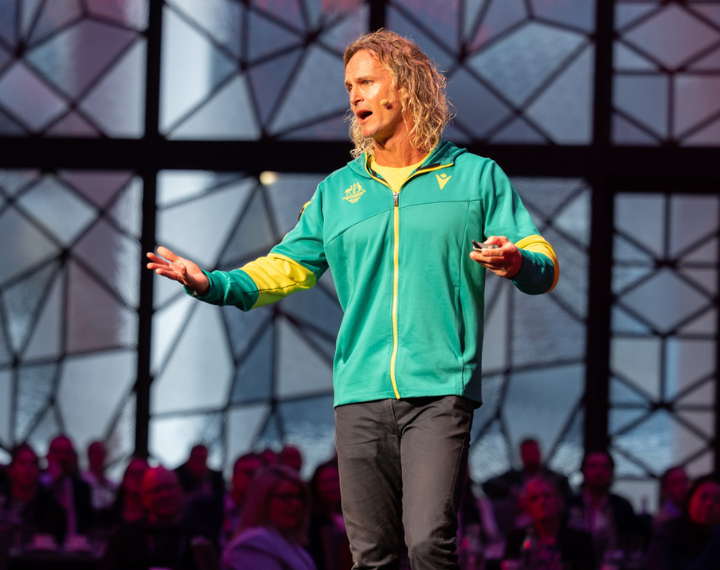Natalie Kyriacou OAM Book as a speaker/entertainer for your next event
Key Points for Natalie Kyriacou OAM
- Natalie Kyriacou OAM holds pivotal positions as a Board Director at the Foundation for National Parks and Wildlife and a Board Committee Member at CARE Australia, showcasing her leadership in environmental and social impact spheres.
- As the Founder and Chair of My Green World, Natalie demonstrates entrepreneurial spirit, leveraging her platform to drive global conservation efforts and promote sustainable practices.
- Natalie's accolades include being an Australian Delegate to the W20 and a UNESCO Pathfinder, underscoring her global influence in shaping environmental policies and initiatives.
- Recognized with prestigious honors like the Medal of the Order of Australia and Forbes 30 Under 30, Natalie's achievements highlight her significant contributions to wildlife and environmental conservation on both national and international levels.
Topics for Natalie Kyriacou OAM
- From rhetoric to reality: The business of environmental sustainability
Powerful forces are reshaping the modern landscape in which leaders now operate, ushering in a new era of business that places environmental stewardship and social equity at the centre. Greater expectation is on businesses and leaders to reframe their company’s role in society and navigate the intersection of environmental, social and governance forces. How can businesses take this bold new wave of commitments from rhetoric to reality and create value along the way?
Key Takeaways:- The economic benefits of addressing climate change: How companies can ensure long-term value while embracing sustainability.
- Key environmental trends in the global market: Who is doing it best, and what we can learn from them?
- A practical guide for embedding sustainability (or ESG) into an organisation.
- How companies and boards can prepare for the next wave of sustainability action.
- How to avoid greenwashing.
- Harnessing technology and innovation for the planet
Technology is fundamentally reshaping our relationship with nature and with one another. Today, there are limitless opportunities for us to harness technology to benefit humankind and its environment.
Technology has the potential to both extend and enrich our experience of life on earth and unlock new solutions to society’s most pressing environmental challenges, or conversely, to widen inequalities and pose existential threats to society. How do we navigate this intersection of two modern phenomena: nature's destruction and technology's growth?
Key Takeaways:- What we can learn from leading innovations in nature technology.
- How individuals, communities, organisations and governments harness frontier technologies to re-imagine how economies could serve better social and environmental needs.
- How technology can address highly nuanced global environmental challenges.
- Critical ingredients to build a technology-enabled future that supports people and planet.
- How to navigate the intersection of two modern phenomena: the destruction of nature and the growth of technology.
- Redefining leadership: The power, voice and impact of young people and diverse voices
Why, in our conversations about corporate leadership, do we not talk more about the power, voice and impact of young people? These voices are consistently underestimated and disregarded.
If we want to know the skills, traits and qualities of an effective leader today and in the future, we need to look towards and share power with young and diverse people. They are not the leaders of tomorrow. They are the leaders of today. And they are shaping our society in profound ways.
Key Takeaways:- What we can learn from young and diverse voices in the pursuit to becoming a better leader.
- How young people are changing the way businesses operate and changing government policies.
- Why leaders that ignore young and diverse voices do so at their own peril.
- How to be an inclusive leader that celebrates, amplifies and meaningfully includes young and diverse people.
- The new leadership landscape: The moral and economic imperative of diversity, equity and inclusion
The tide is shifting in Australia. A signal has been sent to leaders: That is, Diversity, social inclusion, and environmental stewardship are key determinants of a leader's (and businesses) ability to sink or swim.
The dominant paradigm that traditionally excluded women, culturally diverse people, Indigenous Australians and young and marginalised people is coming to an end.
In this time of massive transition, a time when many of us are leading despite the obstacles that face women - particularly marginalised women, we have a unique opportunity to help create an environment that fosters inclusion and shares power with others.
Key Takeaways:- Strategies to embrace and celebrate your worth.
- Actions to narrow the entitlement and opportunity gap.
- How the burden of change falls on the shoulders of marginalised people and how we can stop this.
- How to create a culture that lifts and celebrates a diversity of voices.
- Why your D&I Committee isn’t working.
- Why diversity, equity and inclusion is a moral and economic imperative.
- Wealth, climate and consumption: Our moral duty to the planet and its people
While we take a shared global responsibility for addressing climate change, the truth is, wealthier countries and wealthier people are linked to higher levels of materialism and wastefulness, which is unsustainable and harmful on the planet. To address this issue, we have an opportunity to rethink the relationship between wealth, materialism and wastefulness and recognise we have a moral duty to the planet and its people.
Key Takeaways:- Understand the link between wealth, consumption and climate change.
- Learn how prosperity and economic growth can be improved by challenging notions of ‘conspicuous consumption’.
- Learn how we can perform our moral duty to protect the planet and alleviate suffering.
- Remembering social equity as we address climate change
Climate change is more than an environmental crisis – it is a social crisis. Although women, indigenous peoples and vulnerable and marginalised populations are forced to bear the brunt of the consequences of climate change, they continue to be systematically excluded from decision-making mechanisms. How can we ensure our transition to a clean energy economy is just and equitable?
Key Takeaways:- How women, marginalised communities and, particularly, indigenous voices, are absolutely critical to addressing climate change.
- How to address the inequities of climate change.
- How climate change disproportionately impacts the world’s most vulnerable people.
- Strategies to factor social equity into environmental decision-making.
Testimonials for Natalie Kyriacou OAM
It was my absolute pleasure to work with Natalie Kyriacou OAM on our Queensland Women’s Leadership Symposium. She was such an engaging and inspiring speaker, and she helped set up our event to be an incredibly successful day. Natalie shared stories from her career/professional life which not only resonated with our participants, but included really valuable and practical advice for our participants.
Head of Events
Women’s Leadership Symposium
Natalie is a passionate and engaging speaker who challenges, inspires and mobilises her audience. One of the most popular speakers of the day; we have already booked her for another one!
CEO
Shared Value
Natalie was passionate, articulate and humble, a wonderful combination of attributes that drew in our audience and kept their attention for the full session. We would absolutely welcome Natalie back as she provided a fresh perspective that carefully weaved in much needed tangible and practical actions that we could each implement upon leaving the forum.
UN Global Compact
Natalie is a captivating and thought-provoking speaker, inspiring her audience with vision, purpose and clarity.
Director of Education
Taronga Zoo
Natalie gave an inspiring presentation to our Middle School students about her journey creating My Green World. She speaks naturally and with consideration, and she hit the mark with respect to our desire to engage the students’ climate conscience and entrepreneurship skills. Natalie defies the stereotype that smart girls aren't cool and is a role model to our young people.
Head of Middle School
Haileybury

